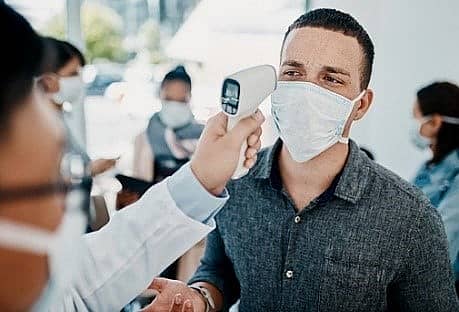On June 18th, OSHA issued Guidance on Returning to Work to assist employers reopening non-essential businesses and their employees returning to work during the Coronavirus pandemic. The guidance supplements OSHA’s previously published Guidance on Preparing Workplaces for COVID-19. The guidelines are consistent with the requirements outlined in the Massachusetts Mandatory Safety Standards for Workplaces and recommend that employers continue to focus on strategies for basic hygiene, social distancing, identification and isolation of sick employees, workplace controls and flexibilities, and employee training.
OSHA’s Guidance on Returning to Work includes a section on Employer Frequently Asked Questions. Some of the questions asked have been coming up at our clients, so I thought it would be helpful to share a few. The responses below are summaries, and the OSHA guidance document should be referred to for the full responses.

Can employers conduct work site SARS‑CoV-2 testing?
Yes. Employers may consider implementing strategies to reduce risks to the safety and health of workers and workplaces from COVID-19 that include conducting SARS-CoV-2 testing if applied in a transparent manner applicable to all employees. Because of the limitations of current testing capabilities, employers should act cautiously on negative SARS-CoV-2 test results. Employers should not presume that individuals who test negative for SARS-CoV-2 infection present no hazard to others in the workplace. Employers should continue to implement the basic hygiene, social distancing, workplace controls and flexibilities, and employee training.
Can employers conduct work site temperature checks or other health screening?
Yes. Temperature checks or other health screening may be done if applied in a transparent manner applicable to all employees. This may include conducting daily in-person or virtual health checks (e.g., symptom and/or temperature screening, questionnaires, self-checks and self-questionnaires). Any such screening should consider ways to maintain confidentiality, as required by the Americans with Disabilities Act (ADA).
In many workplaces, temperature screening efforts are likely to be most beneficial when conducted at home by individual workers, with employers’ temperature screening plans relying on workers’ self-monitoring and staying home if they have a fever or other signs or symptoms of illness, rather than employers directly measuring temperatures after workers arrive at the work site.
What OSHA requirements must an employer follow when conducting health screening, temperature checking, or COVID-19 testing?
If an employer implements health screening or temperature checks and chooses to create records of this information, those records might qualify as medical records under the Access to Employee Exposure and Medical Records standard (29 CFR 1910.1020). The employer would then be required to retain these records for the duration of each worker’s employment plus 30 years and follow confidentiality requirements. However, employers need not make a record of temperatures when they screen workers, but instead may acknowledge a temperature reading in real-time. In addition, temperature records do not qualify as medical records under the Access to Employee Exposure and Medical Records standard unless they are made or maintained by a physician, nurse, or other health care personnel, or technician.
Is there guidance on how to address the various health screening and medical issues associated with COVID-19 to avoid violating other labor, disability, and employment laws?
The U.S. Equal Employment Opportunity Commission (EEOC) has established guidance including What You Should Know About COVID-19 and the ADA. Employers are encouraged to review this guidance as they develop the health screening, workplace policies, return to work plans, and consider other issues that may arise as they reopen their workplaces and plan to continue operations during the COVID 19 public health emergency.
For additional information on OSHA’s Guideline on Returning to Work, or for assistance with your company’s return to work policy, please email [email protected].
